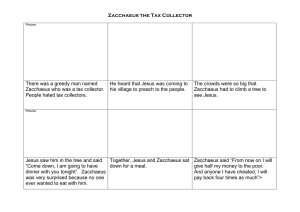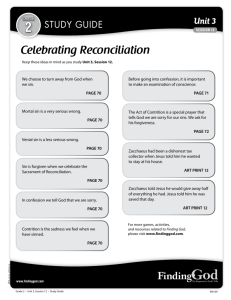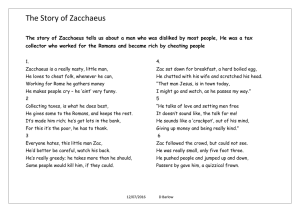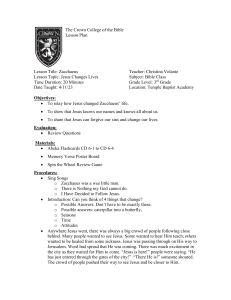Thirty-First Sunday in Ordinary Time November 4, 2007 J.A. Loftus, S.J.
advertisement
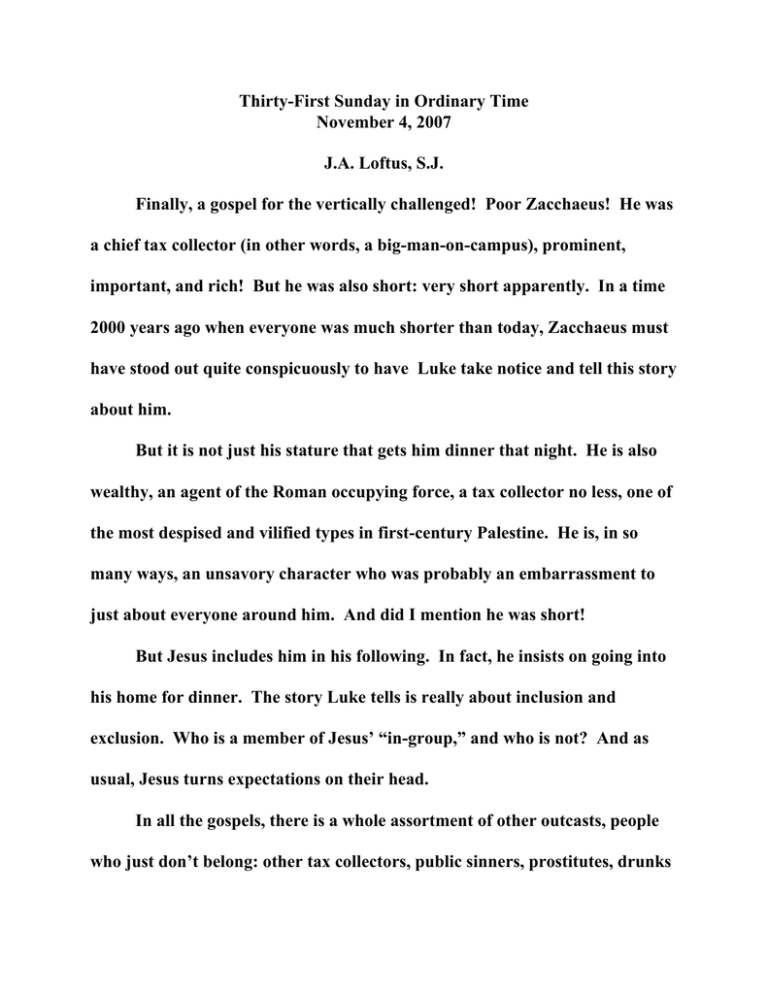
Thirty-First Sunday in Ordinary Time November 4, 2007 J.A. Loftus, S.J. Finally, a gospel for the vertically challenged! Poor Zacchaeus! He was a chief tax collector (in other words, a big-man-on-campus), prominent, important, and rich! But he was also short: very short apparently. In a time 2000 years ago when everyone was much shorter than today, Zacchaeus must have stood out quite conspicuously to have Luke take notice and tell this story about him. But it is not just his stature that gets him dinner that night. He is also wealthy, an agent of the Roman occupying force, a tax collector no less, one of the most despised and vilified types in first-century Palestine. He is, in so many ways, an unsavory character who was probably an embarrassment to just about everyone around him. And did I mention he was short! But Jesus includes him in his following. In fact, he insists on going into his home for dinner. The story Luke tells is really about inclusion and exclusion. Who is a member of Jesus’ “in-group,” and who is not? And as usual, Jesus turns expectations on their head. In all the gospels, there is a whole assortment of other outcasts, people who just don’t belong: other tax collectors, public sinners, prostitutes, drunks and gluttons. Zacchaeus has a host of companions; they are all just as unacceptable! And most of these types still are–even to us! There are always people around who just embarrass us. They don’t belong to our group– whichever groups we belong to these days. Inclusion and exclusion: that’s the point of today’s story. But, on this point of inclusion, the gospels are relentless...and, unfortunately, they are really embarrassing sometimes. Sebastian Moore, an extraordinary contemporary spiritual theologian who used to occupy this very pulpit from time to time, once said: “The world does not like what Jesus shows us God is like.” And it probably never will. You and I may think otherwise, but maybe it’s because we’re good at editing who Jesus says his God really is. It’s not just “the world” that gets embarrassed and wants to re-shape God into something more acceptable. It is, unfortunately, us–you and I–and even our church. We continue to exclude all kinds of people–often in the name of God. Far too many of us still think of God as a good Roman Catholic, maybe even a B.C. grad. God is probably white, relatively well-off, certainly sophisticated, witty, charming at dinner parties. God, in short, must be kind of like us–not like those other people over there. And that’s why we belong to 2 a very special group of God’s chosen. A contemporary theologian, James Alison, says it much more succinctly: “ The beginning of Christian moral life is a stumbling into an awareness of our own complicity in hypocrisy, and a becoming aware of quite how violent that hypocrisy is.” Or, as he says in another place: “Sin is resistence, in the name of God, to the creative work of God which seeks to include us all.” To exclude anyone is to do them violence and to deeply offend the creative, all-inclusive God who invites all out of the trees and into the banquet table. Today’s gospel is not really about the vertically challenged, after all. It is about Jesus trying, yet again, to tell us who his God really is. As Sr. Joan Chittister says it: “Our God is the God of the universe,” who created all and who invites all to the banquet. And, as Christians, “our Creed cannot be denominational, ethnic, racial, sectarian; it is cosmic.” All must be welcomed or none will enjoy fully. One final note: you might ask, as did someone at last week’s Faith Forum discussion after the 10 o’clock liturgy, how does Jesus keep finding these people in his life? Where do they come from and why? The answer is so 3 clear in today’s story. Jesus doesn’t “find” them; he takes the initiative himself. He sees Zacchaeus in the tree and issues his own invitation to join him for dinner. And Jesus bids his friends and disciples–and us–to do the same. “Zacchaeus, too, is a child of Abraham, and today salvation has come to his house.” Only with the same spirit of inclusion and welcome, can salvation can come to our house too. “For the Son of Man has come to seek and to save what was lost.” So keep your eyes peeled for the Sycamore trees all around us. There may be someone waiting to be invited down. 4

